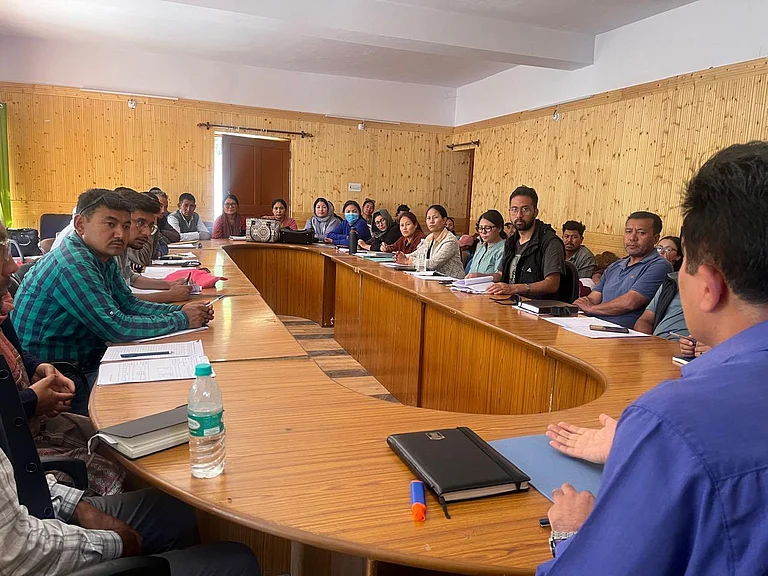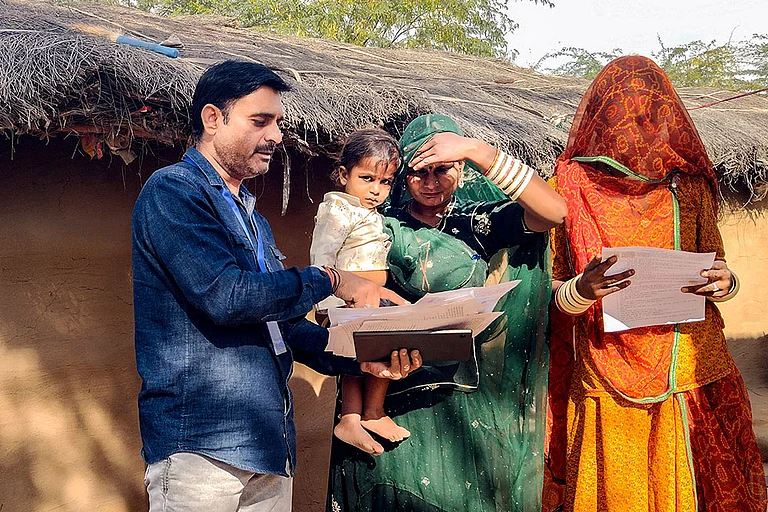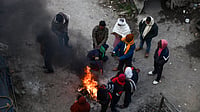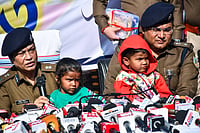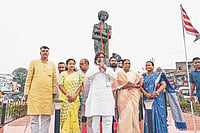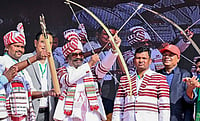The Special Intensive Revision of electoral rolls in Bihar has violated set norms and procedures.
BLOs, under pressure to complete door-to-door surveys within a month, have ended up excluding more than including.
Mahadalits, from parts of the Magadh region of Bihar, are concerned about the objections process.
Balkharwa village in the Imamganj constituency of Gaya district in Bihar rarely makes news, for though it is located on the main road to the biggest town nearby, it is little more than a hamlet. Like those surrounding it, the inhabitants of Balkharwa village are mostly Mahadalit, a term popular since 2007 when it was first used to categorise the most vulnerable among Dalit castes.
But of late, there has been a flurry of activity in this village, a growing sense of unease among members of its Bhuiya and Bhokta Mahadalit residents. The Booth Level Officer (BLO), Vinod Das, who tallied a section of the village for the ongoing statewide Special Intensive Revision (SIR) of voter lists, ended up skipping some of the residents.
One of them is Raghubir, who usually votes at the polling booth number 376, overseen by Das. The 72-year-old is one of the nearly 66 lakh who went missing or were deleted from the draft voter list released by the Election Commission on August 26. The list was prepared with the help of BLOs like Das going door to door, but Raghubir was somehow missed.
Now he is one of the nearly 66 lakh voters seeking inclusion, as the deadline to finalise the voter list approaches.
When the SIR began on June 25, Bihar had 7.89 crore listed voters. By August 1, this number shrank to 7.24 crore. And that is how Raghubir ended up being one of them:
Outlook contacted Das, who has recorded Raghubir as having permanently shifted from Balkharwa, therefore deleting him from the registered voters. According to Das, when he tried to verify Raghubir’s whereabouts, he found out that he was no longer a resident. “He lives with his daughter in Saifganj, about four kilometers away from Balkharwa. He has been informed that his name has been removed,” Das said.
But when this reporter visited Raghubir in Saifganj, he broke down when asked about how his name was removed from the list. The elderly man, a heart patient, had no idea this had happened and was shocked that his precious right to vote no longer existed.
“I recently underwent heart surgery, and there was no one to look after me, so I live with my daughter in Saifganj,” Raghubir said through tears. His wife passed away years ago and he has no sons. The daughter in Saifganj is the closest to him among his three children. “But I regularly go to Balkharwa for work. I was there just a month ago. Many in the village have my son-in-law and daughter’s mobile numbers, but nobody called me [to tell me about the deletion],” he said.
Raghubir had voted at polling booth number 376 in the 2024 Lok Sabha election and in the Imamganj Assembly by-election held last year. His family now plans to pursue the matter on his behalf with the BLO, but it's unclear what the outcome will be.
“Babuji’s health is fragile and he needs care,” says Sunil Kumar, Raghubir’s son-in-law. “I will meet the BLO to find out why my father-in-law’s name was removed.”
In the last election, 1,256 voters were registered at polling booth number 376—it covers voters from three Mahadalit villages close to each other. In the revised draft voter list released on August 1, there are 166 fewer names.
Das explained the deletions to Outlook, saying they were done according to settled rules. He said he deleted 73 as deceased, 35 as permanently shifted, and 22 as duplicate entries, the three primary categories under which voters can be removed from the rolls. “Of the remaining thirty-six, no trace was found, so their names were removed from the list,” he said.
Das also said he went door-to-door to prepare his list, but admitted to problems. He contacted only 20 or 25 families of the deceased voters, leaving out roughly 45 of the 73 he struck off. Similarly, he contacted “10 or 15” families of those who had shifted, skipping about 20 families. And he reached out to ten families struck off the voter list due to duplicate entries, leaving out just as many.
The roughly 70 names his list didn’t include were struck off based on what “other villagers” said about their whereabouts, making his voter verification process slightly different from a door-to-door verification, and at variance with the rules.
Blame it on the haste with which BLOs had to work, or their inefficiency, but Das clarified that only two new voters from the hamlet were added to his list during the exercise.
The credibility of this verification drive of existing voters is questionable, for the process requires that BLOs speak to voters themselves or their relatives before deciding to include or remove their name. Das, however, admits he could not speak to the relatives of all he struck off, only some, citing immense pressure from the Election Commission to complete the process within a month—from June 25 to August 25, 2025.
There were other hurdles, as the rules constantly changed, Das said. “Initially, the commission instructed us to collect documents while filling the enumeration forms. Later, when voters couldn’t provide documents, we were told to fill the forms without documents. It drove us crazy—but what could we do? We are government employees and follow orders,” he explained.
The problem is not Das or Raghubir’s alone, but that of thev nearly one lakh BLOs made to farm out into the villages of Bihar—including the remote, inaccessible ones—and revise voter lists within a month.
As of now, Das said, BLOs have been told they can collect Aadhaar cards of voters have none of the 11 applicable documents specified by the Election Commission.
The most frequently-owned documents—Aadhaar cards, ration cards, PAN cards, driving licenses and voter ID cards—were initially excluded from the Election Commission’s list of documents, causing widespread alarm.
Relaxing the acceptable documents, Das said, came as a significant relief for voters, especially the Mahadalits. If it had not been done, he said, more than half of Bihar’s most disadvantaged voters would have been removed from the list of voters.
But there are still problems, and not just to do with documents. Take Khaira village, also in the Imamganj constituency, around five kilometers from Balkharwa. In this small hamlet of about 20 Bhuiya households are forty or fifty voters, all registered at polling booth number 270 in the last Lok Sabha election.
Munia Devi, a 31-year-old resident of Khaira, said, “We were told that a master would visit us to update the voter list and collect forms. But no one came to our hamlet—not even to ask if we exist.” The ‘master’ she referred to is the government schoolteacher, typically tasked with duties like revising the electoral rolls, designated as a BLO during the process.
But forget BLO, Munia Devi says her hamlet has never seen an Anganwadi worker—the government-appointed workers who provide nutrition and basic health services at the village level.
The residents of Khaira—like many of Bihar and India’s most backward communities, own neither home nor land. But Khaira residents have it particularly hard. They say they are even deprived of free rations and government help to build homes, a scheme launched in the sixties and expanded in the last decade to cover all who needed homes or home repairs.
“When people complain, the mukhiya says, ‘I don’t win with votes from here,’” Munia complains.
The Imamganj Assembly seat is reserved for Dalits, and twice elected Union Minister Jitan Ram Manjhi, former chief minister of Bihar. Last year, after Manjhi won the Lok Sabha election from Gaya, he vacated the Assembly seat. In the by-election held soon after, his daughter-in-law Deepa Manjhi contested and entered the Bihar Assembly. She is married to state minister Santosh Manjhi.
Munia Devi is still registered as a voter—she has checked online. But there’s still an uncertainty troubling her: will the second and final voter list also include her name? After all, she could not submit the form—no BLO came for it—and, as a consequence, her documents were never submitted.
Shikoh Al-Badar, an activist working among Mahadalit hamlets in Bihar’s Magadh region, in which Gaya district falls, said, “The BLO’s work in the Magadh region has been extremely flawed. They never arrived at hundreds of Mahadalit hamlets. Residents were not informed if their names were included or excluded. Many names struck off the voter lists were not properly verified, erasing genuine voters.”
During the first phase of the SIR, the BLOs were supposed to collect a copy of the enumeration form for each voter and leave a signed receipt with the voter. However, even this was not done, making the voting rights of Mahadalits even more precarious, for it would likely hamper their ability to appeal exclusion from the draft roll.
In Magadh, most Mahadalits are landless, often homeless, traditionally residing in the homes of landlords or elite-caste communities. The Bhuiya and Musahar communities have settled in hamlets, but ownership over those areas is historically unclear.
The 2001 Census records the Musahars as 92.5 per cent landless. In other words. They still live on the land of their “employers”, working on farms for a pittance or migrating out of their district or state for a living.
When the BLOs started accepting forms without the 11 documents initially required, since they did not show up in many villages, the migrant workers were the ones left out.
(To be clear, the Bihar government’s Mahadalit Development Mission decided in 2009 to provide residential land to landless Mahadalit families—about three decimal (1,300-sq ft) plots were allotted to 2,46,000 families, of which 2,21,000 actually gained the benefit.)
In an earlier report, this journalist had interviewed a resident of the Guraru Block of Gaya’s Jolbhigaha village, Bigan Manjhi, 55, who had been working 15 km away in Sherghati when his wife brought him the enrolment form. Manjhi had said, “When our ration dealer told my wife that she wouldn’t get rations if she didn’t fill the voter form, she came to me, scared. We filled the form as the BLO instructed—taking photos, affixing whatever documents they had...”
But when they went to the designated school to submit their form, the BLO was not there. Similarly, there were complaints from Saifganj in the Roshan Ganj police station area of Gaya, that the BLO assigned his job to a ‘Jeevika’ scheme worker named Rita Devi. She, in turn, passed on the work to her 25-year-old daughter Mamta Devi. Devi confirmed to Outlook that she filled enumeration forms for 50 people. She did not respond when asked whether she had been trained for the task.
The final impact of the SIR on voter rolls will become clear only when the list is released on September 30, unless the deadline is extended again. But many Bihar residents apprehend that members of Mahadalit communities will dominate the 65.64 lakh names excluded in the draft list. The big question is whether they will be able to provide the proof the Election Commission needs to register them. So far, 25 lakh names have been removed due to migration, 22 lakh declared deceased, 9.7 lakh untraceable, and 7 lakh removed due to duplicate registrations.
The entire exercise has turned into a political blame game as well, with the opposition parties opposing the SIR from the very beginning, and the Congress alleging collusion between the central government and the Election Commission to facilitate “vote theft”. According to Congress spokesperson Pawan Khera, since the release of the first draft, 89 lakh complaints have been submitted to the commission.
However, the Chief Electoral Officer (CEO) of Bihar has said that it is Congress district committee presidents who had submitted these notices, violating the process of filing objections to name removals.






